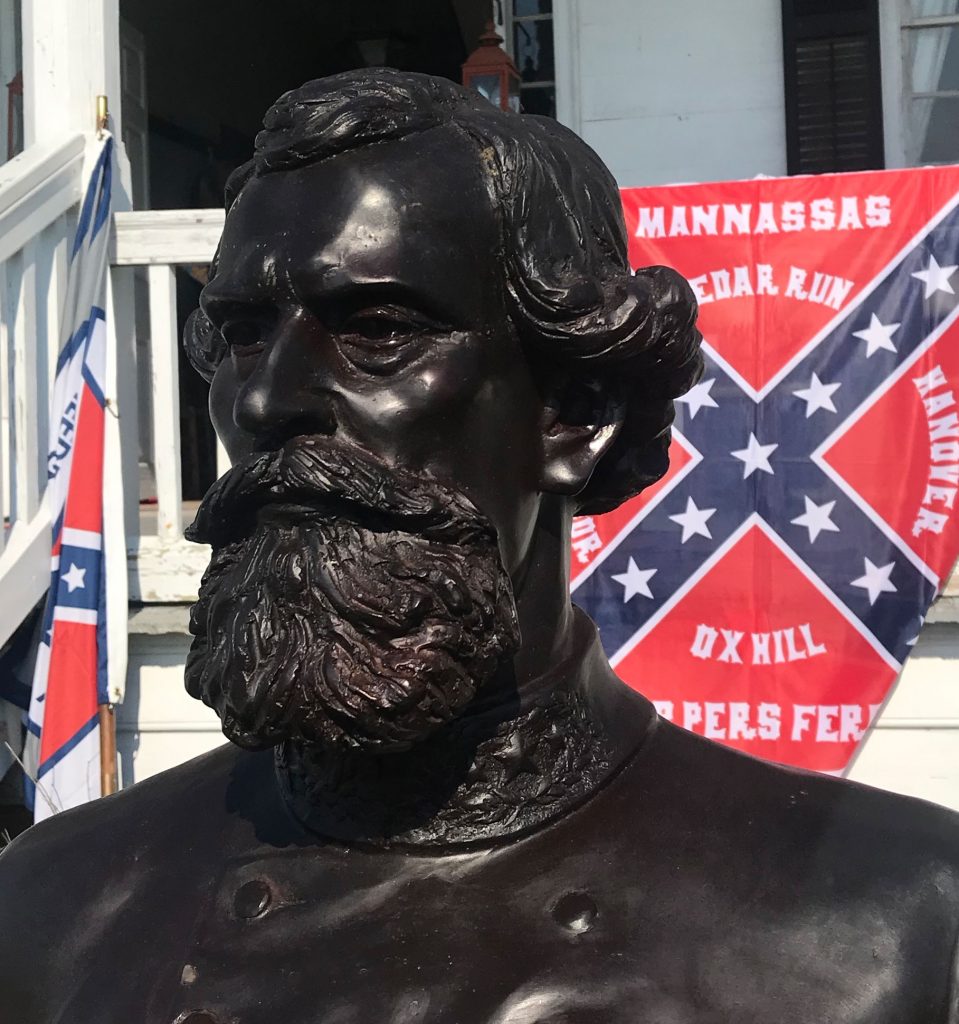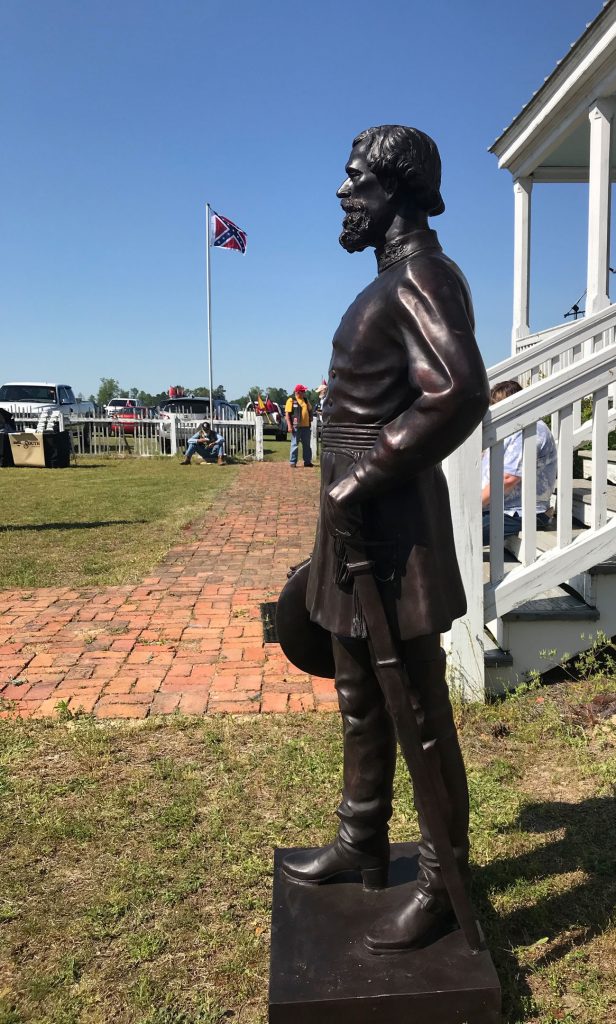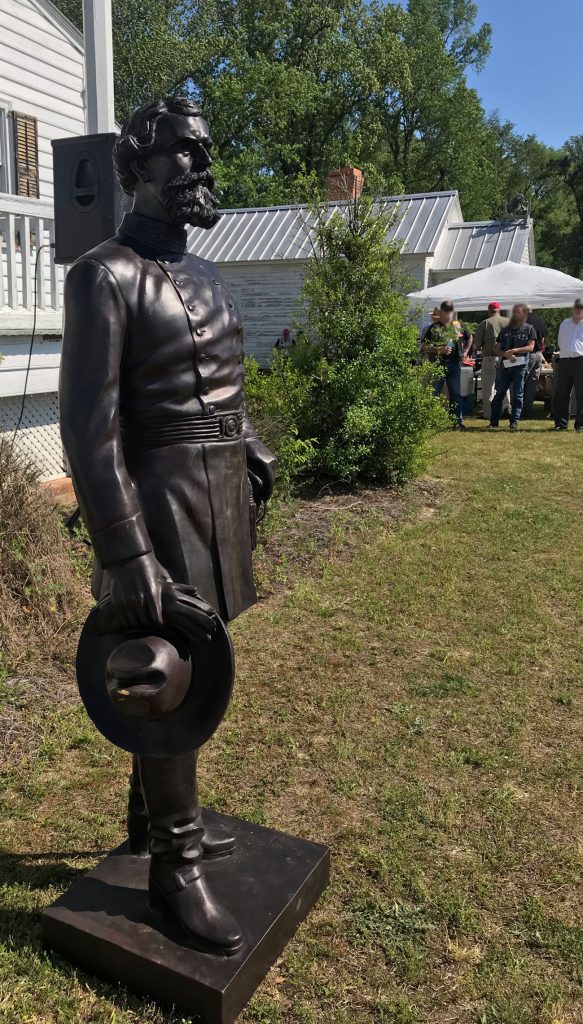
Correcting a historical injustice, the N.C. Sons of Confederate Veterans have commissioned a memorial to honor Lt. General Theophilus Hunter Holmes. The dedication took place on Saturday 27th, April 2019. Please enjoy the history as you read the N.C. SCV Commander’s and Chief of Staff’s Comments, as well, some additional photos of this new memorial, to one of North Carolina’s finest.
Commander’s Comments:
I want to welcome you all here today for this very important milestone in North Carolina’s history. I thank you for coming and for helping us to finally honor a man who has been treated roughly by history’s authors and who has largely been forgotten.
I will let my Chief of Staff talk more about the man we honor here today and his life, but I want to say that despite what you think you know about him and his service during the War, Theophilus Hunter Holmes was a Tar Heel that we can be proud of and that should be honored for his service to his state and to the Confederate States of America.
I believe that a quote from British author Rudyard Kipling sums up our current state of affairs as it regards not only General Holmes, but Confederate Veterans in general:
“In times of war and not before,
God and the soldier we adore.
But in times of peace and all things righted, God is forgotten and the soldier slighted.”
Nothing could more accurately illustrate our problem today. Our country and our political leaders disavow God and malign heroes. They prop up socialism in all of its forms and treat us and our ancestors as expendable nuisances. Great and loyal Confederates like General Holmes are consigned to the landfill of history with only a derisive footnote.N.C. SCV Division Commander Kevin Stone
Our Confederate ancestors died to fight this. We must refuse to allow their sacrifices to be in vain. We act on that refusal that by teaching the young the truth and opening their minds, we act by fighting back as we are able and under the law, and we act by creating new memorials instead of watching them all fall. That is what we are doing and celebrating today.

Chief of Staff’s Comments:
I thank you all for coming to celebrate and dedicate something that is near to my heart and that I think exemplifies one major way in which we can try to turn back the tide that is against us and our ancestors. When we put up a memorial, especially one that does such justice to its subject, we are firing a proverbial volley against our enemies. While we have a long way to go in mounting a viable offense, we are still putting a memorial up for future generations to see in a prominent place in the center of our state. This Division will see to it that more will go up and we must be committed to the maxim that for each memorial that is torn down by a mob or removed by cowardly politicians, two must go up in its place. We are behind in the count but we can catch up. Here is one.
I want to speak about the man we honor here today, Lieutenant General Theophilus Hunter Holmes. He was a senior general in the Confederate Army from 1861 to 1865 and before that was a decorated veteran of the United States Army, having served his country on the frontier, in the Seminole War, and in the Mexican War, and in the Army Administration for over 32 years. He was born at his father’s home in 1804 in nearby Sampson County and died near here in Cumberland County in 1880. He is buried in the MacPherson Presbyterian Church Cemetery.
Part of the reason we chose to honor this man is because we often speak about truth in this organization. One of the great crimes committed against us and our ancestors by the federal government since 1865 is the obfuscation of truth and the intentional censorship of our history and heritage. One major victim of that protracted campaign is General Holmes. He was not only left out of the history books by his enemies, his so-called friends actively worked against his legacy.
“Holmes’ detractors used him as a convenient scapegoat for lost opportunities at First Manassas and in the Peninsular Campaign. They blamed him for the loss of Vicksburg and the Trans-Mississippi. Before the war ended, General P.G.T. Beauregard wrote ‘Epitaph of the Confederate States.’ He declared that the Confederacy was being ‘murdered by Jefferson Davis – aided and abetted’ by other members of his administration. Among the Confederacy’s ‘pallbearers’ listed by Beauregard, General Holmes’ name was prominent.
Subsequent writers diminished Holmes further. One historian, Briscoe Hindman, tried to rebuild his father, General Thomas Hindman’s wartime record at Holmes’ expense. By the early 20th century, Theophilus Holmes, one of only eighteen Confederate lieutenant generals, had faded into obscurity.
In June 1929, the 39th Reunion of the United Confederate Veterans was held in Charlotte, North Carolina. Thousands of former Confederate soldiers attended the week-long event. Confederate heritage groups at the Reunion included the Confederated Southern Memorial Association, the United Daughters of the Confederacy, the Children of the Confederacy, and the Sons of Confederate Veterans. The sixty-four-page official program of the reunion featured dozens of photographs and full-page articles including ‘North Carolina in the Confederacy,’ ‘Important Events of North Carolina, 1861-1865,’ and ‘some of North Carolina’s famous Generals.’ The program did not mention General Theophilus Hunter Holmes.”
Most of this is for two reasons. First, Holmes was not an egotistical or vain man. In simple terms, we would call him a gentleman. Where others jostled for position, Holmes served faithfully. Even to his yankee enemies, who he despised, he remained civil. He once said to a yankee officer in Arkansas, “We hate you with a cordial hatred.” Holmes was candid, and did not guard himself against personal honesty that would give others opportunity to criticize him for their own gain. Neither did he defend himself once criticized. Though this manner of operating is certainly that of a true gentleman, his reputation suffered needlessly at the hands of those who were not gentlemen. Other officers in the Confederate army were far more adept at playing the political games that Holmes ignored.He was not a hypocrite either. He sacrificed all for the Confederate Cause. He led his men from the front, and at the Battle of Helena, Arkansas, his horse was killed as he exposed himself repeatedly to enemy fire. He also suffered from poor health, worsened by the rough conditions of field command. Further, his beloved son and namesake, Theophilus Hunter Holmes, Jr., a staff officer, was killed at the battle of Cold Harbor in 1864. Where some paid lip service to the Cause, Holmes gave all.
Second, Holmes was a devoted friend and loyal subordinate of Jefferson Davis. This friendship and his loyalty to Davis brought him the scorn of those who also hated President Davis. Along with Davis, he suffered constant unfair and unfounded criticism aided by post-war hindsight and legacy-making.
“During the immediate post-war period, when most of the popular history of the conflict was being written, Holmes became increasingly provoked by the Southern adoration heaped on Robert E. Lee and the criticism of Jefferson Davis. Holmes believed that Lee had been merely the instrument of Davis’ wartime genius…Holmes wrote Davis on November 29, 1870, only a month after Lee’s death. He urged Davis to rescue himself from ‘the 2nd place in the hearts of his countrymen.’ In speaking of Lee, Holmes told Davis, “What he was YOU made him…When away from you he FAILED. When near and subject to your supervision and authority he succeeded brilliantly.’ Holmes urged Davis to write a book about the Confederacy so the truth about ‘the Cause we loved and lost’ would be told.”
“He remained loayal to Jefferson Davis to the very end. Davis, like Holmes, had been blamed by many for the loss of the War. In 1879, Holmes wrote to Lucius Bellinger Northrup, former Commissary General of the Confederacy, ‘As for Jefferson Davis, I look upon him as the great sacrifice of the age, his and not Lee’s name should fill the hearts of the Southern people.’ In quoting parts of Holmes’ letter to Davis, Northrup affectionately referred to Holmes as the ‘old paladin.’”Davis himself said of Holmes:
“I, who knew him from our school-boy days, who served with him in garrison and in the field, and with pride, watched him as he gallantly led a storming party up a rocky height at Monterrey, and was intimately acquainted with his whole character during our sectional war, bear a willing testimony to the purity, self-abegnation, generosity, fidelity, and gallantry, which characterized him as a man and a soldier…He has passed beyond the reach of censure or of praise.”The cruelties of reconstruction North Carolina also conspired against General Holmes and his ability to make a living.
“Holmes requested his pardon in early June 1865. In putting his ‘situation’ in the best possible light, Holmes wrote that from early childhood he had been taught that his first allegiance was to North Carolina. He stated that he attended the United States Military Academy and served in the army for more than thirty years ‘without an unfavorable criticism.’ According to Holmes, just before the War started, he received a letter from Governor Ellis of North Carolina ‘claiming my services for my state. This, added to the fact of perfect unanimity among all those that I loved…induced me to resign my commission in the U.S. army and to take service with my state.’ Holmes said, ‘That I was faithful to the service thus accepted, is most certainly true,’ but he said that during the he had never committed ‘an act of cruelty’ nor any deed ‘by which I would be ashamed’…the notorious scalawag Governor Holden received 1,555 requests for pardon. He approved 1,451 and post-poned the decisions on another one hundred. He rejected only four, including Holmes’, on June 12, 1865.”
I would like to close by summing up the career and contributions of this man and what history has largely ignored.
“General Holmes’ most significant contribution to the Confederacy was as North Carolina’s Reserve General. Georgia, Virginia, South Carolina, and North Carolina sent significant numbers of Reserves to the field during the last year of the War. Holmes had mobilized approximately ten thousand North Carolina Junior and Senior Reserves. In so doing, he produced a higher percentage of Reserves from his state’s military population than the other Reserve generals produced in their states.
While reinforcing the army, Holmes maintained North Carolina’s wartime industry and agriculture with detailed workers. Under orders from the war department, he assumed commander of North Carolina’s sprawling conscription bureau and local defense forces. He commanded troops in the field for brief periods at Weldon and Wilmington. His administrative and organizational skills helped maintain North Carolina’s crucial role in the War. His analysis and solution of systemic problems evidence a clear mind and sharp intellect.
Like his counterparts in other Confederate states, Holmes’ service as a General of the Reserves went largely unnoticed after the War. The Confederacy’s conscription of young boys, old men, and African-Americans was a forlorn hope born of brutal necessity. It was not the stuff of glory.”
Let us follow by example and eschew the trappings of so-called glory and instead focus on the hard and inglorious work that must be done in order that the legacy of our ancestors may be secured.
Thank you.N.C. SCV Division Chief of Staff Jake Sullivan
[*quoted material borrowed from “Theophilus Hunter Holmes: A North Carolina General in the Civil War” by Walter C. Hilderman, III]

Help us to preserve our history and heritage by making a donation to the memorials fund today.
If you wish to support our mission please consider a monetary donation to the N.C. SCV Memorials fund.
Donations to the North Carolina Division Sons of Confederate Veterans are fully tax deductible.